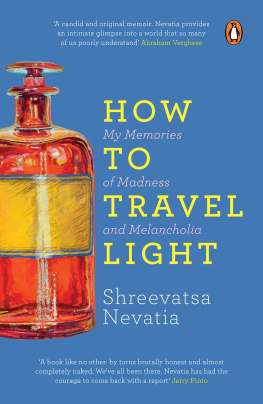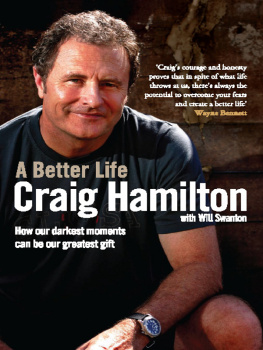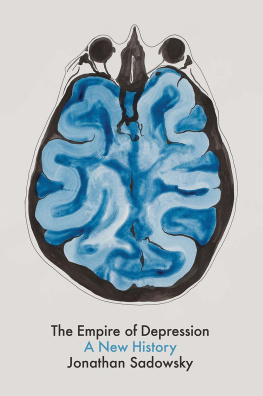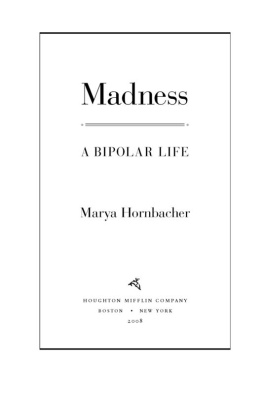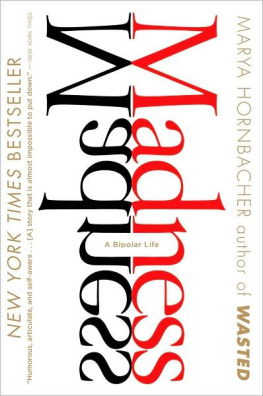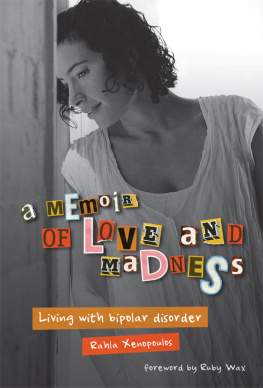Preface
O f all the delusions that mania conjures, I find one is more enabling. I feel I remember everything. At any point, memory is at best a collection of fact and some fiction, but when I am manic, even my inventions start to seem persuasive. A psychotic subject is first an unreliable narrator. Though modern thought dictates that truth is relative, depression, which invariably follows a manic spell, leaves me lumbering with guilt. I know I have lied. I have professed undying love that I never felt. I have exaggerated my pain, and accused family and friends of crimes they had never committed. Honesty is my punishment, and so each time my life is disrupted, I keep a diary. Keeping a record, I find, makes remembering less treacherous.
I was facilitating a writing workshop in 2007 when mania first made me lose sleep altogether. If you havent read Mrquez, you have not had fun, I told a group of eighteen-year-olds. Secretly, though, I had again begun to find solace in the Mahabharata and The Sound of Music. These were the first stories I had been told, and even though madness made linear understanding and thought untenable, it helped me identify with the protagonists. This self-importance was of course annoying, but it allowed me an immersion that, in the end, proved redemptive. By finding myself in books and films, I made sense of my condition.
I started writing this memoir six months after I had been released from a mental health institution. Lithium, therapy and the kindness of my family and friends had helped me arrive at a point where I could think without interruption. My psychoanalyst had also made a breakthrough possible. She told me, More than fabrication, youre prone to fantasy. The trouble with you is that you find reality boring. Trust me, its not that bad. Sitting across from her, twice a week, I began talking about money and food. There was suddenly more joy in the mundane than there was in Kafka. I grew averse to drama. The turbulent events of my life were best related with a smirk.
Almost ten years after I had been diagnosed as bipolar, I was no longer a victim of my affliction. Though imagined, I had seen beauty I never thought could exist. I had been to placeshospitals, Brighton and Benaresthat had inadvertently made me abjure despair. Despite the discipline, the antipsychotics and abstention from marijuana, a lasting sanity could not be guaranteed. I had, however, discovered a levity that helped me laugh and love with abandon. Rather than being embarrassed by my experience, I found it had given me a few good stories to tell. Not everyone gets to think they are Shiva and Bradley Cooper.
Milan Kundera saved me when I was an adolescent and then when I was depressed. In this book, I have quoted him and others like him because it is in their writing that I have found lightness. The medicines I take every day leave my mind and body heavy. It is only in language that I discover an elusive agility. Though I am admittedly more fool than hero, bipolarity has made my many roles and my books matter.
Confession is not an act of courage. It is more cathartic than it is brave. My purpose, if I had to find one, was to play, not pander. This memoir is not a story of survival, of beating the odds or of forbearance. The only heroes of this story are the members of my support system, who, despite my recalcitrance, have stood by me and have helped me find my feet time and again. Unlike others, their names remain unchanged. They are easily identifiable. This is the story of my life as I remember it. My memories might compete with those of the people I mention, but I now have more faith in my history.
August 2017
1
Like Starlight in a Black Hole
O n 28 February 2016, sprinting down Bombays Breach Candy, yelling unsavoury cuss words into my phone, I missed my grandmother. When I was a boy, shed dress me up as Krishna. In photographs she left neatly piled, I see a five-year-old with a peacock feather in his hair, mascara under his eyes, a saffron cloth tied around his waist and a flute in his hand. A row of wooden carvings on a wall of our dining room detailed the nine avatars of Vishnu. Narasimha was half-lion, far too intimidating to be emulated. For a short while, my plastic bow and arrows made me Rama, but when playing the part of my grandmothers beloved Krishna, I felt I monopolized her affection. She told me stories of him when putting me to bed. Often confused by the thievery, polyamory and trickery, Id interrupt her with questions which now seem too human for tales that wondrous. Shed say, Sometimes it doesnt matter what is being stolen. You also have to see who is doing the stealing. Pleasure and roguery, I learnt, somewhat precociously, were permissible when you were the undisputed hero of your story.
In 1988, my family invested in a colour television. The purchase was necessitated by an occasionthe weekly telecast of B.R. Chopras Mahabharat. Every Sunday, I devoured an epic which despite its mature and frequent themes of sex and violence didnt come with a rating. Much like the women in my household, Id wait to see Krishna. I would internalize the curve of his smile and the ease with which hed beckon cows and the gopis who herded them. I soon began to hold invisible mountains on my little finger and then spin the golden Sudharshana Chakra around it. My grandmothers devotion to me may have been quiet, but her adoration was conspicuous. Since my performances always had her as an audience, my pretence was never solitary.
Three years later, when I was in class three, my teacher decreed that all her students would have to enact the Passion of Christ. I might have been used to playing God, but my audition for the role of his favourite son was a disaster. I was given the part of Barabbas, a thief, who, according to Ms Pitre, was too much of a brute to form full sentences. I didnt have any lines. I just had to grunt. A group of my classmates made up the Jewish crowd whod want me freed instead of Jesus. I was suddenly important. On the day of the play, with Jesuit priests in the front row and a stray voice shouting my name, I felt overwhelmed by my significance. I improvised. I tore my shirt on stage, beat my bare chest and, with my teeth clenched, I charged at a nine-year-old Jesus. Ms Pitre caught me by the collar when I walked off the steps, You just had to act mad! Now I know you really are insane.

